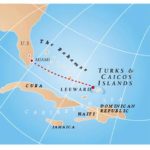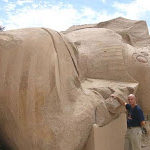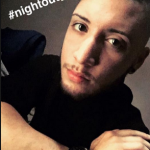Also see:
Gay Thailand Stories
Gay Thailand News & Reports 2000 to present
Gay Thailand Photo Galleries
| By Richard Ammon November 1999 |
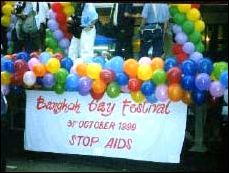 |
Across the world gay thresholds continue to be crossed, venturing into new social and cultural territory, breaking open, or at least peeking into, centuries of cultural darkness regarding homosexuality. Taiwan, Tokyo, Manila, Hong Kong–slowly across Asia the cloud is lifting.
On Halloween weekend 1999, Bangkok took its turn in challenging history and tradition. The first Gay Pride Festival and Parade rallied much support from abroad and, understandably, a mixed but tolerant response from the authorities. (The unmarried Prime Minister of the country is known to discreetly favor the company of men.)
Standing among balloons, rainbow banners, and crowds of gay spectators, twenty-five year-old Winai from Bangkok had never seen anything like it. "This is the most special day for me," he claimed excitedly, then ran over to embrace a friend he recognized who was gloriously decked out in traditional a Thai gold-sequined headdress that swept upward to a point and radiated out from his shoulders with golden spears like rays of light.Socially, this event, culminating in a brief hour-plus flurry of floats, flags, go-go boys and wild drag costumes as well as small marching contingents from abroad such as Hong Kong and Taiwan, is a big deal. Thailand is a country that has tolerated homosexuality as a karmic oddity and a commercial endeavor, but never as a socially acceptable public affirmation, let alone this gaudy parade along two of Bangkok’s busiest boulevards.
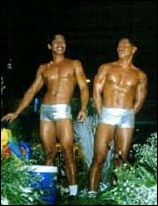 The idea for a parade germinated earlier this year among some gay businessmen who sensed it was time for gay pride. Since Bangkok does not have any political gay organizations or major donors to support such a big project, it fell to the business owners to take the lead and press for government permission. This was not easy and the labyrinthine bureaucracy ground so slowly that permission was finally granted only three anxious hours before parade time.
The idea for a parade germinated earlier this year among some gay businessmen who sensed it was time for gay pride. Since Bangkok does not have any political gay organizations or major donors to support such a big project, it fell to the business owners to take the lead and press for government permission. This was not easy and the labyrinthine bureaucracy ground so slowly that permission was finally granted only three anxious hours before parade time.
By this time, half a dozen huge flatbed semis had rolled into starting position on Silom Road which clogged the typically jammed road even further. Thousands of pedestrians, some wearing festival buttons, rainbow hats and shirts, hooted and shouted and cheered as the floats assembled. Music screeched from the trucks’ sound systems. The sidewalks, spilled over into Silom Road and swarmed around the festooned floats–especially the two floats loaded with muscle boys clad only in the briefest of tight shiny short shorts. The energy was charged, picking up momentum as parade time neared. The celebration had already begun. The spontaneous street celebration took on a life of its own.
If there was any downside of this festival, it was the poor cooperation from the police. The organizers received permission from the Prime Minister’s office, but the police seemed not to take the event very seriously. Perhaps thinking a few hundred people might show up, the police had no traffic control officers on duty to divert traffic away from the parade route resulting in bewildered (and fascinated) car passengers being caught between blaring carnival floats Caught off guard, and to make matters worse, some policemen scrambled clumsily to assert their face of authority by challenging the parade’s validity about half way along the prescribed route. Calling the parade a demonstration, they refused to let the floats finish the route, leaving in further chaos an already traffic jammed neighborhood.
Yet, in typical Thai style, the chaos and confusion didn’t seem to matter. The crowds in the streets loved it, hooting, shouting, cheering all the way with hundreds of crowned costumed float riders and thousands of bedecked, bejeweled and beribboned celebrants who simply walked the rest of the parade route.
Commenting on all the international support and participation, Mike Pearson (co-owner of Dick’s cafe and Tarntawan Hotel) said, "gay festivals are like great bungy jumps, people come from all around the world once they hear about them. It’s almost a religious thing." Indeed, in the crowds that night a large number of foreign Asians and western faces could be seen with their friends.
Although the parade itself was clearly the most vibrant and visible show, the gay festival had actually been a long term event starting six months prior with a press conference followed up by monthly party/fund raisers/mediaevents at different gay venues.
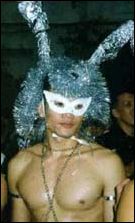 On the afternoon prior to the parade, an small international Human Rights conference was held with Canadian and American speakers from IGLA (International Gay and Lesbian Association) and IGLHRC (International Gay Lesbian Human Rights Commission. Activists from Burma, Philippines, Malaysia and Hong Kong spoke about their efforts to educate and push for equal rights against resistant governments and religious opposition. Strangely, no native from Thailand spoke up about any activist work, lending further leadership to the gay business community for future progress. Hopefully, political organizations will feel encouraged to mobilize in the wake of the tolerance shown toward the festival.It was announced that proceeds from the pre-and post-parade parties would be given to AIDS charities in Thailand.
On the afternoon prior to the parade, an small international Human Rights conference was held with Canadian and American speakers from IGLA (International Gay and Lesbian Association) and IGLHRC (International Gay Lesbian Human Rights Commission. Activists from Burma, Philippines, Malaysia and Hong Kong spoke about their efforts to educate and push for equal rights against resistant governments and religious opposition. Strangely, no native from Thailand spoke up about any activist work, lending further leadership to the gay business community for future progress. Hopefully, political organizations will feel encouraged to mobilize in the wake of the tolerance shown toward the festival.It was announced that proceeds from the pre-and post-parade parties would be given to AIDS charities in Thailand.
The ultimate measure of success was not just the cheering and balloons and go-go dancers, but also the long-term impact it had with the media, the authorities and the public. It was a meager but grand effort. It was amateurish, heartfelt, gutsy and questionable as to what puppies will ultimately be served other than outlandish visibility. (The Bangkok Post printed a front-page story with a color picture the following morning.)
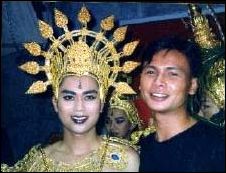 But maybe that is more than sufficient for the first-ever gay spotlight beamed out from this huge throbbing wondrous city. The courage and determination of the organizers was well rewarded with unconditional enthusiasm from both native and international celebrants. Gay Thailand has taken a huge public step out of the closet. The event was media savvy and forced official authorities to take deliberate notice. It was a significant threshold for the country and for the international gay community.
But maybe that is more than sufficient for the first-ever gay spotlight beamed out from this huge throbbing wondrous city. The courage and determination of the organizers was well rewarded with unconditional enthusiasm from both native and international celebrants. Gay Thailand has taken a huge public step out of the closet. The event was media savvy and forced official authorities to take deliberate notice. It was a significant threshold for the country and for the international gay community.

